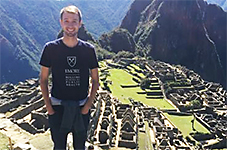Fifth Prize Peace Corps Fund Award: “Where Carbs Mean Friendship” by Lucas Gosdin (Peru)

Lucas Gosdin at Machu Picchu
Lucas Gosdin (Peru 2013-15) served as a community health volunteer in Peru where he had two host families and lots of friends. He loves to visit them and communicate with them through WhatsApp. Lucas never learned how to make good ceviche, but he can make a lot of delicious dishes you have never heard of. Lucas is a doctoral student studying maternal and child nutrition at Emory University. He also conducts research in Peru.
•
Where Carbs Mean Friendship
by Lucas Gosdin
EVERY GUEST KNOWS that refusing food might be considered rude. Now imagine being in a place where friendship is measured in food. After hugging me and calling me her new son, the first question my host mother, Teo, asked was, “Qué no te gusta comer?” — what don’t you like to eat? After living in Peru for a few months of training, I knew the connotation attached to that question; she was nervous about whether I would like her food and wanted to know if I was skinny because I was a picky eater. For the rest of my time in her home, I ate everything Mamá Teo served me: rice, noodles, potatoes, and many times all three.
Being the first Americans in Pomacochas, we were welcomed with equal parts skepticism and curiosity. Our integration into the community could be measured in plates, cups, and sore feet. Town celebrations are the lifeblood of the social scene. Delicious carb-filled cuisine, sugar cane alcohol, and lots of dancing are the requisite parts of any good celebration, and we were invited to them all.
But eating well is not just for parties. The local clinic and I identified an older pregnant woman living alone. She was an incredibly kind woman but was obviously not taking me seriously – the young man who talked about the importance of good nutrition and breastfeeding. Over time and with each visit to her home, we became friends until one day she invited me for lunch. She had no income and a small field where she raised chickens and planted vegetables. Despite my reluctance eat food from one who had so little, there was no way to refuse. She seated me in the only chair in her home and served me the largest plate of boiled corn I had ever seen. I thought I must finish it even if it takes me two hours. An hour passed. Seeing my plate half empty, she served me more. When I reached the point where I could bear no more, I apologized for not being able to finish. She was not offended. Pouring the remainder back into the boiling water she laughs and said, “I thought you were going to finish the entire pot!” With this gesture, she had shown me that our friendship had grown beyond the bounds of a normal serving.
Similar moments happened throughout my Peace Corps service, much to Mamá Teo’s dismay saying, “People will think I don’t feed you.” Everyone fed me, and I fed them sometimes too. Their kindness and immense friendship made Pomacochas home to me. Accepting me — a young, gay man from rural Alabama — is a plate I could never finish.
There’s a phrase Peruvians sometimes say: “Caras conocemos. Corazones no sabemos.” It means “we know faces, but we don’t know hearts.” This is not always true. I know what is hearts of many Peruvians because of what they put on my plate. May we all give and receive more friendship than we can eat.
•
No comments yet.
Add your comment